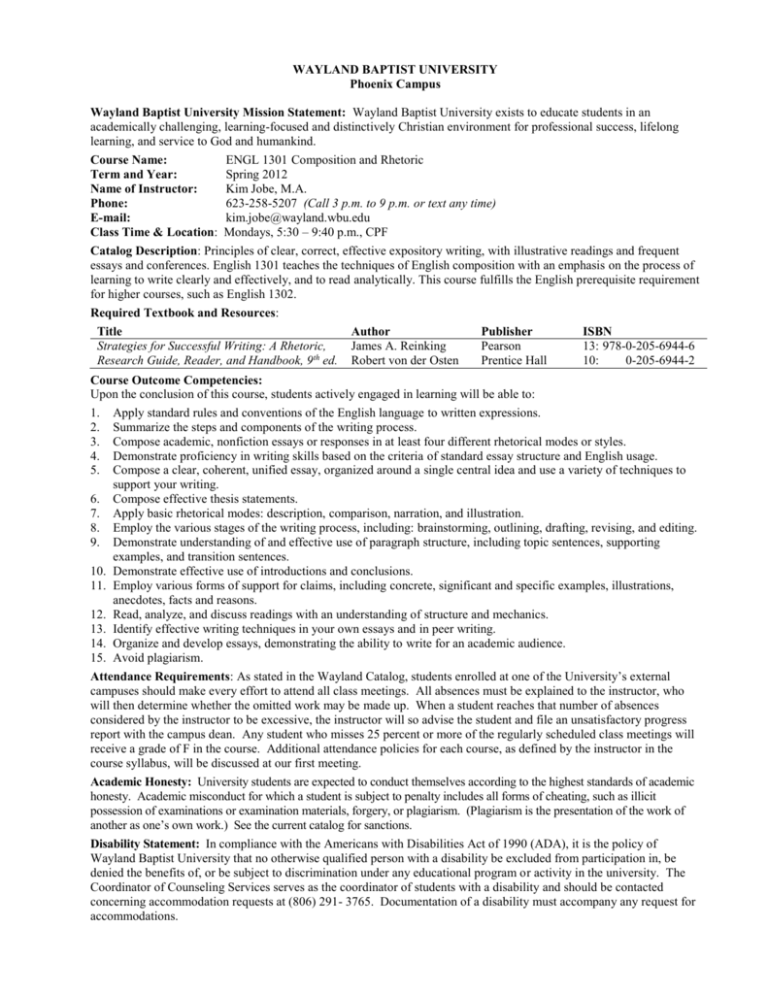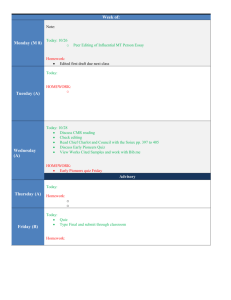
WAYLAND BAPTIST UNIVERSITY
Phoenix Campus
Wayland Baptist University Mission Statement: Wayland Baptist University exists to educate students in an
academically challenging, learning-focused and distinctively Christian environment for professional success, lifelong
learning, and service to God and humankind.
Course Name:
ENGL 1301 Composition and Rhetoric
Term and Year:
Spring 2012
Name of Instructor:
Kim Jobe, M.A.
Phone:
623-258-5207 (Call 3 p.m. to 9 p.m. or text any time)
E-mail:
kim.jobe@wayland.wbu.edu
Class Time & Location: Mondays, 5:30 – 9:40 p.m., CPF
Catalog Description: Principles of clear, correct, effective expository writing, with illustrative readings and frequent
essays and conferences. English 1301 teaches the techniques of English composition with an emphasis on the process of
learning to write clearly and effectively, and to read analytically. This course fulfills the English prerequisite requirement
for higher courses, such as English 1302.
Required Textbook and Resources:
Title
Strategies for Successful Writing: A Rhetoric,
Research Guide, Reader, and Handbook, 9th ed.
Author
James A. Reinking
Robert von der Osten
Publisher
Pearson
Prentice Hall
ISBN
13: 978-0-205-6944-6
10:
0-205-6944-2
Course Outcome Competencies:
Upon the conclusion of this course, students actively engaged in learning will be able to:
1. Apply standard rules and conventions of the English language to written expressions.
2. Summarize the steps and components of the writing process.
3. Compose academic, nonfiction essays or responses in at least four different rhetorical modes or styles.
4. Demonstrate proficiency in writing skills based on the criteria of standard essay structure and English usage.
5. Compose a clear, coherent, unified essay, organized around a single central idea and use a variety of techniques to
support your writing.
6. Compose effective thesis statements.
7. Apply basic rhetorical modes: description, comparison, narration, and illustration.
8. Employ the various stages of the writing process, including: brainstorming, outlining, drafting, revising, and editing.
9. Demonstrate understanding of and effective use of paragraph structure, including topic sentences, supporting
examples, and transition sentences.
10. Demonstrate effective use of introductions and conclusions.
11. Employ various forms of support for claims, including concrete, significant and specific examples, illustrations,
anecdotes, facts and reasons.
12. Read, analyze, and discuss readings with an understanding of structure and mechanics.
13. Identify effective writing techniques in your own essays and in peer writing.
14. Organize and develop essays, demonstrating the ability to write for an academic audience.
15. Avoid plagiarism.
Attendance Requirements: As stated in the Wayland Catalog, students enrolled at one of the University’s external
campuses should make every effort to attend all class meetings. All absences must be explained to the instructor, who
will then determine whether the omitted work may be made up. When a student reaches that number of absences
considered by the instructor to be excessive, the instructor will so advise the student and file an unsatisfactory progress
report with the campus dean. Any student who misses 25 percent or more of the regularly scheduled class meetings will
receive a grade of F in the course. Additional attendance policies for each course, as defined by the instructor in the
course syllabus, will be discussed at our first meeting.
Academic Honesty: University students are expected to conduct themselves according to the highest standards of academic
honesty. Academic misconduct for which a student is subject to penalty includes all forms of cheating, such as illicit
possession of examinations or examination materials, forgery, or plagiarism. (Plagiarism is the presentation of the work of
another as one’s own work.) See the current catalog for sanctions.
Disability Statement: In compliance with the Americans with Disabilities Act of 1990 (ADA), it is the policy of
Wayland Baptist University that no otherwise qualified person with a disability be excluded from participation in, be
denied the benefits of, or be subject to discrimination under any educational program or activity in the university. The
Coordinator of Counseling Services serves as the coordinator of students with a disability and should be contacted
concerning accommodation requests at (806) 291- 3765. Documentation of a disability must accompany any request for
accommodations.
ENGL 1301 Jobe
2
Course Requirements and Grading Criteria:
Grading Percentage
Quizzes (10)
Journals (10)
Paragraphs (4)
Essays (4)
Participation in class
Final exam
10%
10%
20%
40%
10%
10%
NOTE:
*Students will upload all
writing assignments
(except drafts)
to SafeAssignment
via Blackboard.
Grading for Course
90 - 100 %
A=
80 - 89 %
B=
70 - 79 %
C=
60 - 69 %
D=
below
60 %
F=
Reading Assignments
You will read chapters in the textbook (almost) every week. We will also use other parts of the book (reader,
handbook) for in-class assignments.
Quizzes
You need to complete short quizzes about the assigned reading before class. The quizzes will be in
Blackboard, in the Course Content folder for the week the reading was due.
Journal
You will be required to keep a journal and will be expected to write in your journal for 15 minutes per day, at
least five days a week. (Note: This is meant to increase your writing fluency, not to be a burden. Set your
timer for 15 minutes if you want; if you only get one or two sentences written during that time on some days,
so be it!)
Since this is a journal, you don’t have to worry about transitions or opening and closing paragraphs. Do
practice using topic sentences for your paragraphs, though, and try to spell and punctuate correctly. You may
write about anything you want. This isn’t supposed to be a diary, but you can write about something in
particular from your life, if you wish. Some people in the past have complained about bosses. Some have
talked about what they want to do in the future. Some have given their opinions on issues in the news. One
even gave his own narration of sports he was watching on TV.
Each week’s journal should be a separate word processing document, and you will upload the files via
SafeAssignment in Blackboard. The link to SafeAssignment will be in the Course Content folder for the
week the journal is due.
Format of Papers
The papers you submit via Blackboard (journals, paragraphs and essays) should follow this layout:
1. Select one-inch margins.
2. Select a font size of 12 with a standard font (like Times New Roman).
3. Double spaced with the first line of each paragraph indented ½ inch.
4. On the first page:
a. Put your name and the date at the top right corner in the top header.
b. Center the title. (For example: “Journal #1” or “Description”)
5. On subsequent pages, put your name at the left margin and page number at the right margin in the
top header.
NOTE: Paragraphs should be about half to three-quarters of a page. Essays should be 3-4 pages.
Portfolio
You will be required to hand in a writing portfolio with all of the work you have done for the course,
collected together, including your drafts of papers and peer reviews. Bring this portfolio with you to all
conferences with the instructor, and you should also make it a point to evaluate your progress as you go
along. This counts toward your grade in your writing assignments (paragraphs and essays) and classroom
participation (peer reviews). It is due during the next-to-last class and will be returned to you in the last class.
ENGL 1301 Jobe
3
Tentative Schedule:
Week 1
20 Feb Do before the first class:
Read:
Syllabus and Strategies ch. 1-2 (pp. 3-29)
Write: Write draft of Journal #1 in class.
Quiz:
Quiz #1 in Blackboard (on syllabus & reading assignment)
Week 2
27 Feb Read:
Strategies ch. 3-4 (pp. 30-77)
Write: Journals #1 & 2 due & bring draft of paragraph #1 (general topic)
Quiz:
Quiz #2 in Blackboard
Week 3
5 Mar Read:
Strategies ch. 5 (Paragraph)- 6 (Sentences), pp. 78-113
Write: Journal #3 due, paragraph #1 due, bring draft of paragraph #2 (general topic from ex.)
Quiz:
Quiz #3 in Blackboard
12 Mar SPRING BREAK
Week 4 19 Mar Read: Strategies ch. 7 (Diction) – 8 (Narration), pp. 114-151
Write: Journal #4 due, paragraph #2 due, bring draft of paragraph #3 (narration)
Quiz:
Quiz #4 in Blackboard
(Individual conferences before and after class.)
Week 5 26 Mar Read:
Strategies ch. 9 (Description) – 10 (Process), pp. 152-181
Write: Journal #5 due, paragraph #3 due, bring draft of paragraph #4 (description or analysis)
Quiz:
Quiz #5 in Blackboard
(Individual conferences before and after class.)
Week 6
2 Apr Read:
Strategies ch. 11 (Illustration) – 12 (Classification), pp. 182-209
Write: Journal #6 due, paragraph #4 due, bring draft of essay #1 (illustration or classification)
Quiz:
Quiz #6 in Blackboard
Week 7
9 Apr Read:
Strategies ch. 13 (Comparison) – 14 (Cause & Effect), pp. 210-239)
Write: Journal #7 due, essay #1 due, bring draft of essay #2 (comparison or cause & effect)
Quiz:
Quiz #7 in Blackboard
Week 8 16 Apr Read:
Strategies ch. 15 (Definition) – 16 (Argument), pp. 240-291)
Write: Journal #8 due, essay #2 due, bring draft of essay #3 (definition)
Quiz:
Quiz #8 in Blackboard
Week 9 23 Apr Read:
Strategies ch. 17 (Mixing) -18 (Essay Exam), pp. 240-291
Write: Journal #9 due, essay #3 due, bring draft of essay #4 (argument)
Quiz:
Quiz #9 in Blackboard
(Individual conferences before and after class.)
Week 10 30 Apr Read:
Strategies ch. 19 ()
Write: Journal #10 due, essay #4 due, & portfolio due
Quiz:
Quiz #10 in Blackboard
(Individual conferences before and after class.)
Week 11 7 May Read:
—
Write: Written part of final exam (in class)
Final:
Final exam in Blackboard (before class)
NOTE: Upload writing assignments that are “due” to SafeAssignment in Blackboard before the beginning of class on
the day they are due. Bring printed copies of “draft” papers with you for peer review.








